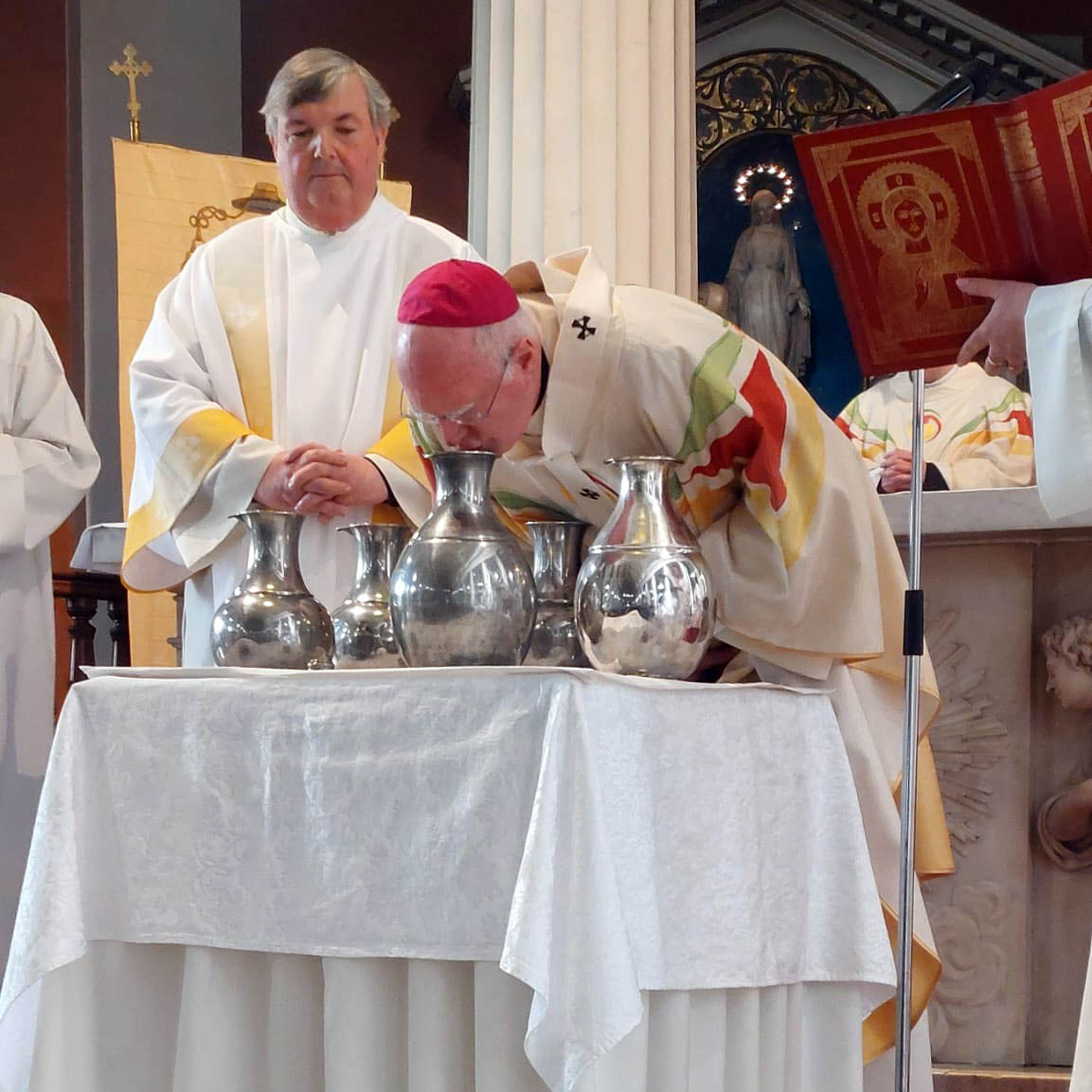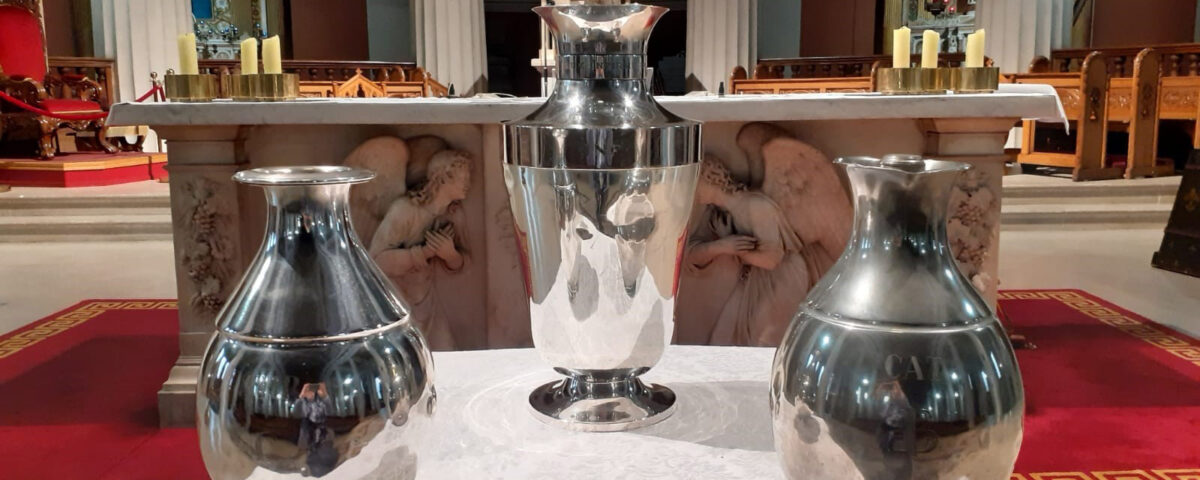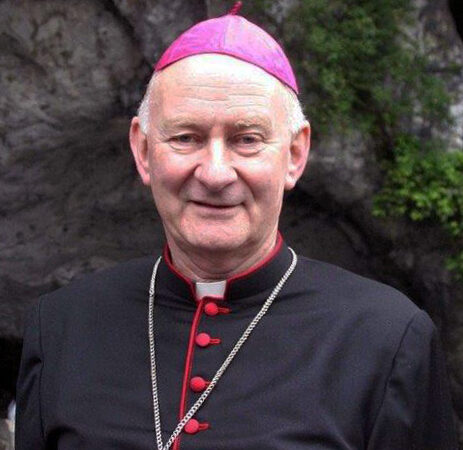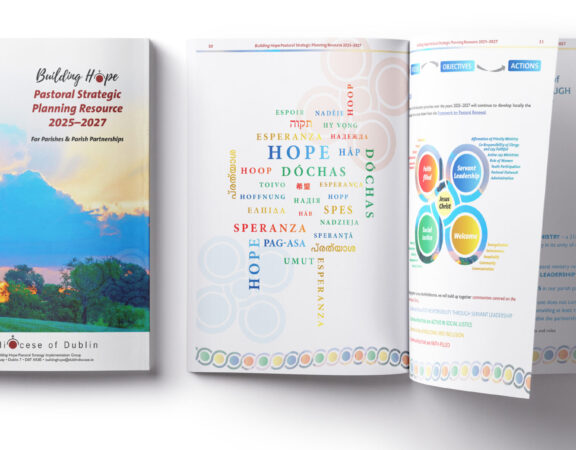The Spirit of the Lord is Upon Us
Chrism Mass, Holy Thursday, March 28, 2024
St Mary’s Pro-Cathedral, Dublin
Homily of Archbishop Dermot Farrell
“The Spirit of the Lord is upon me …” It is not a story of anointing that the Church puts before us at the Chrism Mass, this Mass of the holy oils. No, nor is it a story of healing (to mirror the Oil of the Sick), or strengthening (to mirror the Oil of Catechumens), or of consecration (to call to mind the Chrism), but a story of mission. Why? Because at the heart of our ministry is not just service; at the heart of our ministry is mission. Let us look at the mission of Jesus, keeping before us Luke’s larger story and its unfolding: the reaction of Jesus’ neighbours in surprise, anger, and violence (see 4:29–30).
The Wilderness Journey of Jesus
Immediately before our Gospel scene, Jesus had been tested in the wilderness, tested by hunger, by the temptation to power, and by what one might call the temptation to give up. None of these are easy places to be, but for Luke, this is where God brings Jesus: “filled with the Holy Spirit…Jesus was led by the Spirit into the desert” (4:1). Luke, in common with Mark and Matthew, stresses that Jesus’ journey in the desert was the work of the Holy Spirit.
Luke introduces the scene we have in today’s Gospel in an almost identical way: “Jesus returned to Galilee …in the power of the Spirit” (4:14). In the power of the Spirit, Jesus presents himself and his mission to his family and neighbours: “the Spirit of the Lord is upon me… he has sent me …” (4:18)
In a broader optic, today’s Gospel story is but an interlude in a long wilderness journey: Jesus goes in and out of the wilderness until his death. However, this journey is a journey in which Jesus is led by the Spirit, and filled with the Spirit. From the moment of his conception until his death, Jesus is filled with the Spirit, just like us. Only at his death does he hand over his spirit: ‘Father, into your hands I commend my spirit.” Only in his death does the Spirit leave the earthly Jesus (see 23:46).
The Wilderness and the Spirit

The way of Jesus is the way of the Church. Like him, our life is of the Holy Spirit. Jesus did not determine the “external” context of his ministry, no more than we can determine the situation of the Church, or that of the world which we inhabit. The Spirit does not take away the desert; in fact, the witness of the Scriptures and of the great saints points to the very opposite: to follow the Spirit is to be brought into the wilderness. Remember Augustine, John of the Cross, Teresa of Avila, Maximilian Kolbe. To be led by the Spirit is to be brought into the wilderness; to follow Jesus is to negotiate the wilderness with him. Jesus gives us a way through the wilderness. With him, we come though the wilderness, as Thomas Merton put it, “with our capacity for feeling expanded and deepened, strengthened against the appeals of falsity, warned against temptation…” (Thoughts in Solitude [New York: Farrer, Straus and Cudahy, 1958], 28).
The Wilderness Journey of the Church
None of us needs to be told how our Church is going through a wilderness time. Our faith calls us to trust that this is where the Spirit is leading us. Even if many find this paradoxical, our Catholic tradition asks us to see in our engagement with the changing world, a foundational part of our Christian calling. Without discerning what God is doing in our own lives, and in the life of the Church, we remain outsiders to the mystery into which we have been called.
Fruits from the Wilderness
In that perspective then, I’d like to move beyond the temptation of looking only at what we have lost, and consider what we have received. Let me reflect with you this morning on some of the fruits of the Spirit out of our common journey with the Lord—in a real sense, our journey together though this time of wilderness.
First of all, I sense that our Church is humbler. This humility enables us better to see ourselves as we truly are. It is the only way to draw close to the Lord “who humbled himself, even to accepting death on the cross,” as the hymn from Philippians, which we read on Sunday last, never ceases to proclaim (Phil 2:8). A humbler Church is a more Christ-like Church, a Church with a different presence; it offers a different path to people, another horizon for our living. That can only authentically happen in the power of the Spirit.
A second fruit I see, is greater participation of the faithful in the life and ministry of the Church. Priests and people are beginning to work in a more co-responsible way. Together we are embracing more the reality that these parishes and ministries are ours. The ‘chaplain’ who is a mother can minister in a way that complements the ministry of the priest. It is not either-or; it is both-and. We have a growing sense of reality, a deepening sense of the mystery entrusted to us. Perhaps things are moving slower than we would like. Yes, there are different rates of ownership and participation. This is not an easy journey. But real journeys are rarely straightforward, and they always take time. As Pope Francis says, “discernment takes time … many think that changes and reforms can take place in a short time, [but] we always need time to lay the foundations for real, effective change.” (Antonio Spadaro SJ, “A Big Open Heart to God: An Interview with Pope Francis: America, 30th September 2013: page 17)
A third fruit can be seen in a changing vision of priesthood. In life, crises bring people to a sense of reality; in Church life it is no different. The ‘vocations crisis’ across the developed world has brought into sharp relief that priesthood, while sacramental, is more than sacramental ministry; priesthood is also about the charism of leadership. The priest is called from among God’s people to leadership and service. It is not feasible to have ever larger parishes with fewer and fewer priests. The constraint of numbers is bringing us to see more clearly what lies at the heart of priesthood in our tradition. Is this re-discovery not also a work of the Spirit?
Anointed for Mission—“A Church that Steps Outside Itself”
For all this, there will remain a tension between, on the one hand, discerning where the Spirit is leading us into the future and, on the other hand, acknowledging the draw of the past, and of our traditions, which have given so much expression to who we are. However, as I underlined on St Patrick’s Day, many of the pastoral approaches and strategies of mission that worked for our Church in this land over the last two centuries no longer work in the 21st century. Responsibly seeking appropriate responses has been the constant call of the Church and of its Magisterium in, and since, the Second Vatican Council. As Pope Francis says,
“Instead of being just a church that welcomes and receives by keeping the doors open, let us try also to be a church that finds new roads, that is able to step outside itself and go to those who do not practice, to those who have left [the Church] or are indifferent.” (Spadaro, “Big Open Heart to God,” page 23)
When the Church’s horizon is only about itself, our Church has lost its way. The Church becomes most itself when we go beyond ourselves, when we reach out to all our sisters and brothers. Christ was anointed with the Spirit, not for himself, but to go out. He was anointed with the Spirit for mission, especially to the poor, the excluded, those isolated, to the sick and migrants, to all those who are invisible to the world, but precious to God. This is what we are about. This is who we have to keep before us. This is why the Father sent the Son, and why the Lord sends us.
In the Spirit, New Sight to our Eyes—A New Vision of Parish, a New Vision of Priesthood
Today, in Christ, we are called to trust where God’s Spirit is taking us. “Today this Scripture is fulfilled in your hearing,” says Jesus in the Gospel. Today is the day the Lord speaks to us. Today is the day the Lord reaches out to us. This is the favourable time; we have no other. To follow Christ is not to hanker after an idealised past. Today is the day of grace; this is the day of salvation. Today is our Church’s day, not yesterday. Let us take the Lord at his word; let us permit him to bring good news to us in our poverty. In this renewal of vows, may we permit Christ to bring new sight to our eyes, to see his way afresh, and to embrace for ourselves and our people the freedom, and the life, that he alone can bring.
+Dermot Farrell
Archbishop of Dublin







